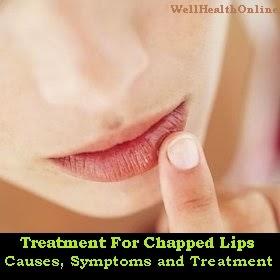Primary Causes of Chapped Lips
Exposure to the seasonal elements - Dry air, wind, sun and/or cold temperatures can wreck havoc on sensitive, unprotected lip tissue.
Contact dermatitis should be considered and may be stemming from allergies and/or topical irritation.
Medications could be a factor. Suspect any newly started medications as the potential source of irritation.
Signs and symptoms of chapped lips
Your child's lips may be:
· Dry
· Red
· Cracked
· Peeling
Treatment of Chapped Lip
Some common treatment of Chapped Lip :
Apply lip balm or petroleum jelly. You can also try coating your lips with skin moisturizer, vitamin E oil or aloe vera gel. These greasy products help keep your lips properly moisturized. Drink plenty of water toprevent dehydration.
Keep in mind that cracks at the corners of your mouth can indicate riboflavin deficiencies; you can treat this with vitamin B-2 supplements.
Use a humidifier to moisturize the air in your home, helping to prevent both dry lips and skin.
Use an oil-based lubricating cream, such as Aquaphor Healing Ointment, or lip balm containing petrolatum or beeswax.
Choose a lip cream or balm that contains sunscreen. Sun exposure contributes to chapped lips.
Treat chaffed, chapped and scaling lips overnight with a homemade ointment mixed from 1 tsp glycerine, 1 tsp lemon juice and 1 tsp castor oil. Spread on lips overnight, refrigerating the leftovers for future use.
Add humidifier(s) to your home. Lips, hair, nails and skin all thrive in humidified air.
Add a coat, when you wear a coat - Keep lips shielded against the elements with a coat of petroleum jelly, balm (non flavored, without phenol or camphor) or Aquaphor ointment (a celebrity favorite).
Seal in the moisture. Right after the compress, apply a thick coat of an emollient ointment like Vaseline or a lip balm containing waxes or lanolin to hold the moisture in.
Step up to cortisone. If a week of compresses and emollients don't do the trick, you can add over-the-counter 1 percent hydrocortisone ointment to your regimen. Use the hydrocortisone under your emollient ointment, he suggests. Try this for two weeks.By Corwin Brown


